
Should you scrape your tongue before or after brushing?
Getting into the routine of cleaning your tongue is an excellent way to start improving your dental hygiene, but it’s worth taking the time to make sure you do it right. Scraping your tongue will help no matter what, but it can be more effective if you follow our expert recommendations. So let’s take a look at the best way to clean your tongue.
Do you scrape your tongue before or after brushing?
A good oral health routine involves brushing, interdental cleaning and tongue scraping, but it’s not always immediately obvious which order these steps should be done[1]. Fortunately, a simple dentist-approved phrase can help you to remember – Inside, Outside, Upside.
-
- Inside
First, start by cleaning between your teeth – either by flossing or using interdental brushes. Dentek’s Triple Clean floss picks use extra strong, textured floss to help you reach those areas of the teeth your toothbrush can’t get to.
-
- Outside
Next, take two minutes to brush your teeth as you normally would using your toothbrush and a fluoride toothpaste. Remember not to rinse your mouth afterwards – or use mouthwash – in order to give the toothpaste more time to do its job[1].
-
- Upside
Finally, the third step is to use a tongue scraper such as Dentek’s Orabrush tongue cleaner, which is modelled on dentists’ tools to give a more professional clean. Scraping your tongue last allows any debris plenty of time to be dampened and loosened while you’re doing the other steps. This helps you ensure you get the best results possible.
Again, it’s not recommended to rinse your mouth or use mouthwash immediately after cleaning your mouth and teeth, as this can wash away the helpful fluoride contained within your toothpaste. Instead, consider using mouthwash as a rinse around half an hour after eating to remove bacteria and food particles[1].
How often should you scrape your tongue?
Of course, when we’re discussing the right order in which to do these different aspects of your dental hygiene routine, we should also acknowledge how often each day you should complete them.
It’s a well known fact that it’s best to brush your teeth twice a day for two minutes at a time – although some people choose to do so more frequently than others. For example, some people brush their teeth half an hour after eating in order to not allow food particles to linger for too long. It’s also recommended that you should floss twice at least twice a day to achieve a deeper clean[1].
When it comes to tongue scraping, twice a day is best, too. However, don’t worry if that feels like too much to begin with. Cleaning your tongue once a day is better than nothing, so start there and build up the habit. You’ll start to feel the benefits quickly. Then, once scraping your tongue has become a normalised part of your morning or evening routine, up it to twice a day in order to get the full advantages.
How long should you scrape your tongue for?
This is a commonly asked question about tongue scraping, and it’s easy to see why. With flossing or interdental cleaning, you do this for as long as it takes to clean between each of your teeth. When brushing, you can use a two-minute timer – electric toothbrushes usually come with this feature. But how long should you clean your tongue for at a time?
This can vary from person to person, depending on how much debris there is to dislodge. You may find that the process takes longer when you first get started, with it speeding up as you become more comfortable using a tongue scraper. Generally speaking, a good rule of thumb is to allow around two minutes to scrape your tongue after brushing your teeth.
As with brushing your teeth with a toothbrush, there are plenty of ways you can make brushing your tongue easier and even fun. Two minute brushing songs can help to make the time seem shorter, and timers can make sure you don’t go on for too long or not long enough by accident. And if you’re trying to help a child get into the habit of cleaning their tongue safely, there are plenty of resources online to help you do so.
Resources:
[1] https://www.nhs.uk/live-well/healthy-teeth-and-gums/how-to-keep-your-teeth-clean/




